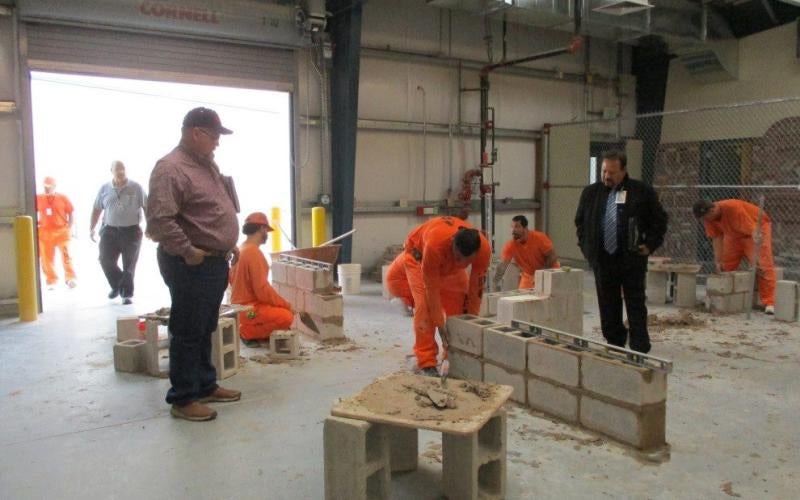
AWC offers three CTE certificate programs at Arizona State Prison Complex - Yuma
July 18, 2019Masonry graduate recently selected to teach at Arizona Department of Corrections Second Chance Center
Yuma, AZ (July 18, 2019) – In an effort to reduce recidivism, Arizona Western College currently has three Career and Technical Education (CTE) certificate programs for incarcerated students to enroll in at Arizona State Prison Complex - Yuma. Available programs for inmates at three of the five units at the facility include Masonry, Foundations of Construction, and Plumbing.
The programs prepare students for work upon reentry into the community and also provide an opportunity to continue on with higher education through the pursuit of additional credentials.
“While we’re not able to document or track student success at this time, feedback from friends of inmates that have gone out and received good paying job offers based on credentials received from this program has not only been satisfying for me as a teacher, but more importantly it has also been inspirational for future inmate students looking to change their lives,” said AWC Coordinator of Prison Programs Pat Lamaestra.
Inmates in the Masonry program recently had a chance to demonstrate their skills during an interview for a teaching assistant position at an Arizona Department of Corrections (AZDOC) Second Chance Center in Maricopa County. Second Chance Centers provide a 10-week program that’s designed to prepare inmates for reentry into their communities and the workforce.
“We were asked by Top Quality Masonry Company and AZDOC to provide them with one of our graduated students to teach Masonry at a Second Chance Center in Phoenix, as our program is one of the best in the state,” said Lamaestra.
The 14-credit Masonry program, taught by Lamaestra, instructs inmate students on basic masonry materials, tools, techniques, and safety precautions. The goal is for students to continue their education after their release through an apprenticeship, so they can further develop their skills as a mason while also being able to earn a paycheck. Lamaestra, who has taught for the college’s prison programs since 2004, also teaches at the AWC Yuma campus, sits on the Yuma Private Industry Council (YPIC) board for construction education, and assists with local SkillsUSA competitions.
The 10-credit Foundations of Construction program, taught by Arturo Vargas and Jeffrey Draper, is intended to prepare individuals for entry-level work in the building construction industries or to pursue additional training in a specific construction trade. The vision for the Foundations of Construction program is for it to become increasingly recognized by the community for preparing self-confident, competent graduates able to perform in the construction field. Vargas has designed blueprints and judged for the local SkillsUSA competition in Carpentry and Draper has experience remodeling homes.
The 16-credit Plumbing program, taught by Ray Barcena, also prepares students for entry-level positions by giving them the skill sets needed to succeed and a solid base on which to expand their educational aspirations. The goal for this program is for it to become a trusted training program for employers to hire from in the surrounding communities and at state level apprenticeships. Barcena also teaches at the AWC Yuma Campus, has maintained his C-36 Plumbing Contractors License, and continues to work on plumbing projects to stay up to date with current industry practices.
Program faculty members also take part in community meetings to further their education through YPIC and the Yuma Contractors Association.
All three programs teach communication skills and critical thinking by challenging students with both mental and physical projects, some of which are completed as a group in order to expand their team building and cohesive abilities to work together among different cultures and ethnicities.
Studies have shown that correctional education has led to the reduction of recidivism rates and improves an inmate’s chances of not returning to prison. It also has been shown to improve an inmate's chances of obtaining gainful employment after release. These results can lead to lower crime rates, more savings for taxpayers, and long-term contributions to the safety and well-being of the communities to which formerly incarcerated people return.
In 2017, AWC was recognized for having the second highest number of inmate students who completed a CTE program while in the AZDOC.
Contact:
Pat Lamaestra
Coordinator of Prison Programs
Arizona Western College
Pasquale.Lamaestra@azwestern.edu
(928) 627-8871
